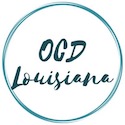Written by Michele Carroll
Selecting the person who listens to your deepest, darkest thoughts and fears, and then helps you overcome them, isn’t an easy task. In some ways, it’s similar to purchasing a car or choosing a college, but even more important. You’re going to be investing your trust, time, and your mental health in the person you choose, so here are some things to consider before deciding on a provider.
The first thing you might do is talk to a trusted friend or family member to see if they have any recommendations for therapists who treat OCD or anxiety. I would not recommend simply opening up the proverbial “yellow pages” and seeing who has the biggest ad. If speaking with loved ones doesn’t help, I would definitely recommend going online and looking at the list of providers from the International Obsessive Compulsive Disorder Foundation’s website. This page explains each of the ways providers can be categorized (by type, speciality areas, treatment strategies, and more) and how to use their resource directory. Pro tip – if there is no one listed in your city, expand the search radius to 250 miles to see who might provide teletherapy to Louisiana. You may also have luck contacting your insurance company for a list of in-network providers.
A few things to consider are what type of provider you would like to work with (i.e., psychologist, social worker, or therapist; male or female; etc). When you make the first phone call, if you think or know you have OCD, find out how the provider treats the condition. Do they engage in talk therapy or exposure with response prevention? This point is really important, as exposure with response prevention (ERP) is the gold standard for OCD treatment and talk therapy is not as helpful. Ask about the provider’s experience in treating the condition and get an idea of how many sessions clients usually receive prior to completing therapy. Find out if the provider accepts your insurance, if they are licensed in your state, and if they offer telehealth sessions.
When you have your first session, see how you feel speaking with the person. Although the first session is often uncomfortable, did the provider seem to listen? Were they kind? Were they judgmental or did they seem open-minded? Did they seem knowledgeable and comfortable talking about OCD and ERP? Keep in mind that the provider you choose isn’t a friend who simply listens and gives advice. The person is a trained professional who will help you learn strategies to overcome OCD.
Overall, consider the differences that exist between therapists when making your decision (keeping in mind that it may take time to connect with the right therapist), and then make your choice. Trust yourself when deciding, and commit to making change to live the life you deserve. After all, you do indeed deserve it.
For more about this topic, take a look at the IOCDF’s website: How to Find the Right Therapist, How to Access and Understand Your Mental Health Benefits and Obtain Referrals, and Know Your Rights, Understand Your Coverage!
Michele Carroll is a licensed clinical psychologist in Louisiana who is a founding member of OCD Louisiana and currently serves as vice president of the affiliate. In her spare time, she enjoys spending time with family and friends, volunteering, and cheering on the Tigers.
